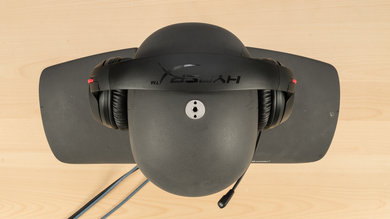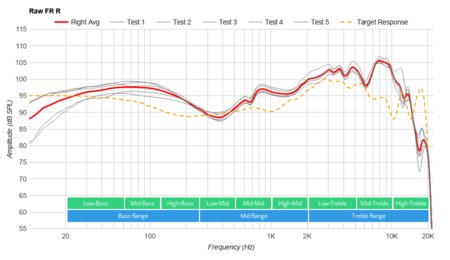The HyperX Cloud Flight are good, wireless gaming headphones with a fairly well-balanced and excited sound profile, though their bulky over-ear design makes them very sensitive to fit and seal. Unfortunately, they don't feel as durable as some of the other HyperX models we've tested, but they don't feel too cheap and are quite comfortable. Their microphone performs very well overall and is able to separate your voice from background noise. They're wirelessly compatible with the PS4, PS5, and PCs, though unfortunately, not with the Xbox One or Xbox Series X consoles, and they're audio-only when used wired. Their detachable mic and casual design make them a decent choice for day-to-day use, but they don't support Bluetooth, so you'll have to use them wired with your phone. They also don't help bring much quiet in the office or during your daily commute, as they block very little background noise.
Our Verdict
The HyperX Cloud Flight are alright headphones for neutral listening. They're comfortable and have a somewhat excited sound profile with a good amount of bass that doesn't overpower instruments or vocals. While they sound a bit sharp on some bright tracks due to the peaks in the higher-frequencies, they're well-balanced enough for most popular genres. Unfortunately, like most closed-back headphones, they don't have a very spacious or open soundstage.
- Comfortable design.
- Versatile sound profile.
- Great battery life (with LEDs off).
- Very good overall mic performance.
- Poor noise isolation.
- Slightly leaky at high volumes.
- Bass delivery varies significantly across users. Sensitive to glasses.
The HyperX Cloud Flight aren't the best option for commuting or travel. They don't block out much background noise, so they don't help give you quiet during a long travel day or your daily commute. They also don't support Bluetooth, so you have to use them wired with your phone, and their limited control scheme means you have to take out your phone to change tracks or pause your music. On the upside, they have a casual closed-back design and detachable microphone, making them more suitable for day-to-day use than typical gaming headsets.
- Comfortable design.
- Versatile sound profile.
- Great battery life (with LEDs off).
- Very good overall mic performance.
- Poor noise isolation.
- Slightly leaky at high volumes.
- Bass delivery varies significantly across users. Sensitive to glasses.
The HyperX Cloud Flight are gaming headphones that aren't designed for use while working out. They don't support Bluetooth, so you have to use them wired to your phone, or with their USB receiver plugged into a computer. While they should be decently stable enough for light jogs, they'll likely fall off during more intense workouts. They also aren't very breathable and cause your ears to get hotter than usual while working out.
- Comfortable design.
- Versatile sound profile.
- Great battery life (with LEDs off).
- Very good overall mic performance.
- Poor noise isolation.
- Slightly leaky at high volumes.
- Bass delivery varies significantly across users. Sensitive to glasses.
The HyperX Cloud Flight are only mediocre for office use. These headphones are designed for use at home while gaming and block very little background noise while also leaking a lot of your audio, which can be distracting to co-workers. On the bright side, they're comfortable enough to use all day, and their somewhat well-balanced and excited sound profile is versatile enough for most popular genres. They also have an excellent 30-hour battery life, which should easily get you through a few full workdays if you use them wirelessly with your computer.
- Comfortable design.
- Versatile sound profile.
- Great battery life (with LEDs off).
- Very good overall mic performance.
- Poor noise isolation.
- Slightly leaky at high volumes.
- Bass delivery varies significantly across users. Sensitive to glasses.
The HyperX Cloud Flight are decent wireless gaming headphones. They have a fairly well-balanced and excited sound profile that gives gunshots and explosions a good amount of thump and rumble, without drowning out dialogue during cut-scenes. They have a very good detachable boom microphone that's able to separate your voice from background noises, making them suitable for use in loud environments. They work wirelessly with very low latency when used with a PC, PS4, and PS5 consoles with their USB receiver, but unfortunately, they don't work wirelessly with Xbox One. Their comfortable design and long battery life make them good for long gaming marathons, though they'll likely cause your ears to get fairly warm after a few hours.
- Comfortable design.
- Versatile sound profile.
- Great battery life (with LEDs off).
- Very good overall mic performance.
- Poor noise isolation.
- Slightly leaky at high volumes.
- Bass delivery varies significantly across users. Sensitive to glasses.
The HyperX Cloud Flight are good headphones for wired gaming if you use them with a separate microphone since they're audio-only when using them with a 1/8" audio cable. That being said, they're compatible with PS4, PS5, Xbox One, and Xbox Series X consoles by plugging them into the controller and are comfortable enough for long gaming sessions.
- Comfortable design.
- Versatile sound profile.
- Great battery life (with LEDs off).
- Very good overall mic performance.
- Poor noise isolation.
- Slightly leaky at high volumes.
- Bass delivery varies significantly across users. Sensitive to glasses.
The HyperX Cloud Flight are a decent option if you make a lot of phone calls through a computer with applications like Skype. Their microphone works wirelessly when using their USB receiver, though unfortunately, they don't support Bluetooth and their audio cable doesn't have an in-line mic, so you can't use them for phone calls on a phone.
- Comfortable design.
- Versatile sound profile.
- Great battery life (with LEDs off).
- Very good overall mic performance.
- Poor noise isolation.
- Slightly leaky at high volumes.
- Bass delivery varies significantly across users. Sensitive to glasses.
Changelog
- Updated Dec 08, 2022: We've added a comparison between HyperX Cloud Flight and the HyperX Cloud Stinger 2 in the Recording Qualitybox.
- Updated Oct 05, 2021: Converted to Test Bench 1.5.
- Updated Mar 29, 2021: Updated 'App Support' as the HyperX Ngenuity is no longer directly available. Also added PS5 and Xbox Series X compatibility.
- Updated Feb 05, 2020: Converted to Test Bench 1.4.
Check Price
Popular Headphones Comparisons
The HyperX Cloud Flight have a fairly straightforward design that isn't as flashy as some other gaming headphones. They're comfortable and have a detachable microphone, making them a decent choice for day-to-day use, though you'll need to use them wired with your phone since they don't support Bluetooth. Unfortunately, they don't feel nearly as durable or well-built as other HyperX headsets, like the HyperX Cloud 2/Cloud II or the HyperX Cloud Core. If you're in the market for a good pair of gaming headphones, check out our recommendations for the best gaming headsets for PC, the best PS4 headsets, and the best Xbox One gaming headsets.
The HyperX Cloud Flight and the HyperX Cloud 2/Cloud II Wireless have different strengths, and you may prefer one over the other. The Cloud 2 Wireless are more comfortable and better built. They have a virtual soundstage feature, their mic offers a slightly better recording quality, and they have a lower non-Bluetooth wireless latency. However, you can use the Flight passively if you prefer a wired connection, although you can only receive audio and can't use their mic using this connection. Their boom mic also has a better noise-handling performance.
The HyperX Cloud Stinger and the HyperX Cloud Flight are both decent gaming headphones, though they have different designs. The Cloud Flight are wireless and can only be used wired for audio only, while the Cloud Stinger are wired only for both audio and microphone. Both headphones feel decently well-built and just as comfortable. While the Cloud Flight's sound profile is slightly better balanced, they're both similar and very susceptible to fit and seal, so different people will likely experience their sound reproduction differently.
The HyperX Cloud Flight are slightly better gaming headphones than the HyperX Cloud Alpha. The Cloud Flight are wireless gaming headphones that can also be used wired, while the Cloud Alpha are wired-only. The Cloud Flight have a better microphone that does a great job separating your voice from background noise. On the other hand, the Cloud Alpha are more comfortable and look and feel quite a bit more durable and well-built. They also are less bass-heavy, though they lack quite a bit of presence and detail in the treble range.
The HyperX Cloud 2/Cloud II and the HyperX Cloud Flight are both decent gaming headphones, but their main difference is that the Cloud II are wired while the Cloud Flight are wireless. The Cloud II feel a bit better built, thanks to their metal frame, and are a bit more comfortable during long gaming marathons. On the other hand, the Cloud Flight have a better-balanced sound profile and dedicated customization software, though it doesn't offer many options.
Test Results

The HyperX Cloud Flight have the same design language as the rest of the HyperX lineup but don't look as premium or as sturdy as some other HyperX gaming headphones, like the HyperX Cloud Alpha. They have a more typical headband design with a detachable boom mic, and decently sized oval, ear cups that swivel to lay flat. This gives them a casual over-ear look that you can comfortably wear as your daily drivers, especially if you turn off the LEDs. They don't look as flashy as some of the other gaming headsets, which some people may prefer; however, they aren't available in any other colors, which might disappoint some people.
The HyperX Cloud Flight are comfortable headphones, but they're not as well-padded as the HyperX Cloud 2/Cloud II or the HyperX Cloud Alpha. On the upside, they're slightly lighter than those headphones since they have a bit more plastic in their build. The headband isn't too tight on the head, and the ear cups are decently spacious. Overall, they should be comfortable enough for most long gaming marathons without causing any fatigue.
The HyperX Cloud Flight have a simple and efficient gaming control scheme. They have a volume dial and a microphone mute button on the right ear cup. The power button also cycles between the different LED lighting patterns. Feedback is decent but the volume dial lacks discrete notches and end points so the dial keeps spinning even when you're at max volume (you do get auditory feedback though). The buttons are also slightly mushy but still deliver enough tactile feedback when pressed.
Like most closed-back, over-ear headphones, the HyperX Cloud Flight are not very breathable, especially in warmer conditions. They create a fairly good seal around your ears which obstructs a lot of airflow and makes your ears relatively warm after about an hour of continuous listening. They should be okay for most casual uses like gaming but aren't the best choice for more strenuous activities like working out or running.
The HyperX Cloud Flight are not very portable headphones due to their bulky design. The ear cups lay flat and their boom mic is removable, making them easier to fit into a bag, though unfortunately, they don't come with a carrying case. While their detachable mic makes them a decent option for day-to-day use, they don't support Bluetooth so you'll have to use them wired to your phone.
The HyperX Cloud Flight have a decent build quality but don't feel as premium or as durable as other gaming headphones we've tested, like the SteelSeries Arctis 7 2019 Edition or the HyperX Cloud Mix. They have a flexible but thin metal frame and dense ear cups that should be able to withstand a few accidental drops or bumps. Unfortunately, they have a lot more plastic in their build than most other HyperX options, and they have more moving parts and hinges that may be susceptible to wear and tear in the long run.
The HyperX Cloud Flight aren't the most stable headphones. They're tight enough that they shouldn't move during regular use, like gaming, but slide around during even mildly-strenuous workouts. Since they don't support Bluetooth, if you want to use them out of the house, you'll have to use them wired with an audio cable, which can get easily snagged while working out or running.
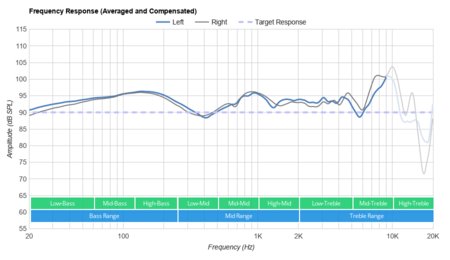
The HyperX Cloud Flight have a somewhat well-balanced but excited sound profile. They have a fair amount of extra bass that gives extra kick and thump to genres like hip-hop or EDM but isn't too over-powering for rock. Overall, they're versatile enough for most popular genres and content.
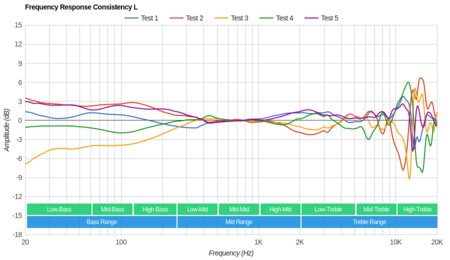

The frequency response consistency of the HyperX Flight is disappointing. People with long hair or glasses experience their bass reproduction differently, as it's difficult to get a proper seal due to their bulky design and large ear cups. Their treble response is also greatly dependent on fit, seal, and positioning, so you might have to adjust them on your head slightly.
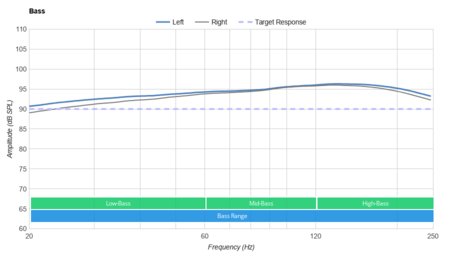
The bass accuracy of these headphones is decent. While most of the range is fairly even and flat, it's over-emphasized throughout most of low-bass and all of mid-bass and high-bass. This gives the headphones a good amount of extra kick and thump that, unfortunately, can also sound slightly boomy. It's worth noting that their bass delivery varies significantly across users, and is very sensitive to fit and seal. The response here represents the average bass response and your experience may vary.
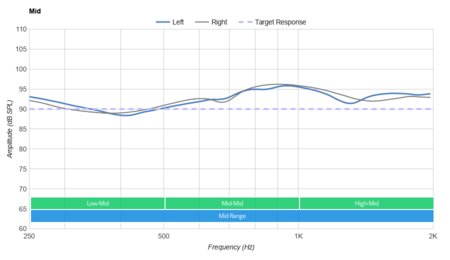
The mid accuracy of the HyperX Cloud Flight is good. Most of the range is fairly well-balanced and even, except for a slight emphasis in mid-mid to high-mid that helps some vocals and instruments stand out without getting drowned out by the over-emphasized bass range.

The HyperX Cloud Flight's treble accuracy is only okay. Most of low-treble is fairly even and balanced, which is great. While low-treble is slightly over-emphasized, it shouldn't sound too sharp or painful to most people. That being said, the over-emphasized mid-treble range makes some sibilants (S and T sounds) sound piercing and painful. High-treble is quite uneven, though it's likely at a high-enough frequency that it shouldn't be noticeable to most people.
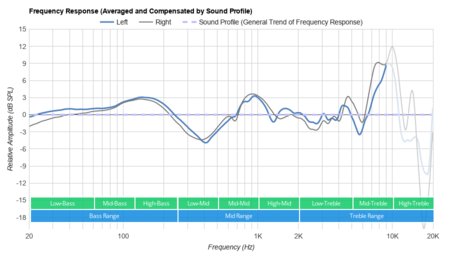
The peaks and dips performance of the HyperX Cloud Flight is decent. The peak in high-bass followed by the drop in low-mid causes some sounds to be slightly boomy and muddy. Meanwhile, the huge peak in mid-treble causes sibilants to be quite painful and piercing.


The imaging performance of these headphones is great. The GD graph also shows that almost the entire group delay response is within the audibility threshold, resulting in a tight bass and a transparent treble reproduction. Additionally, the L/R drivers of our test unit are very well-matched in amplitude, frequency and phase response. This ensures an accurate placement and localization of objects (voices, instruments, video game effects) in the stereo field.

The HyperX Cloud Flight's soundstage is mediocre, which is to be expected from closed-back over-ears. There's a good amount of pinna activation, however, the interaction isn't very accurate, creating a soundstage that is perceived to be located inside your head, as opposed to in front.
These headphones don't have a virtual soundstage feature. If you want a similarly-performing gaming headset that does, check out the HyperX Cloud Flight S.
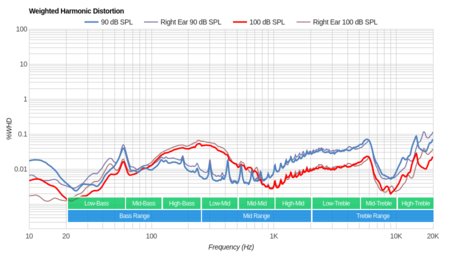
The weighted harmonic distortion of these headphones is decent. The entire range is below the audibility threshold, even at louder volumes, resulting in a clean and pure audio reproduction.
These are the settings used while testing these headphones; therefore, the results are only valid when used at these settings.
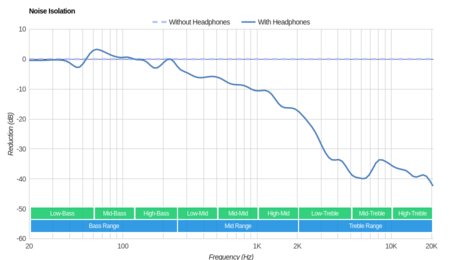
These headphones do a poor job of blocking out background noises. In the bass range, where the rumble of airplane and bus engines sits, they don't provide any isolation. They do a slightly better job at blocking out background speech, though they're still sub-par in this regard. They do a better job at higher frequencies, making them a great choice for blocking out the sounds from an A/C unit or fan.
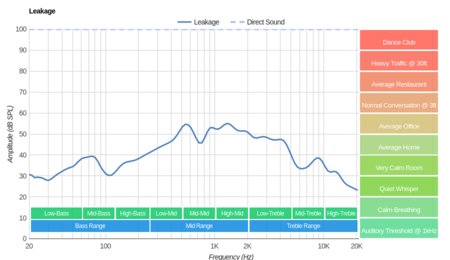
The leakage performance of the HyperX Cloud Flight is only acceptable. At higher volumes, they reach the noise floor of an average office, so nearby co-workers may get distracted by your music.
These headphones have a detachable boom microphone.

The recording quality of the microphone is very good. While on a phone call or gaming, your voice sounds very full-bodied, detailed, and natural. If you're looking for a HyperX headset with even better recording quality, check out the HyperX Cloud Stinger 2.

Update 12/16/2021: These headphones have been updated to test bench 1.5. In this update, we made changes to the way we test noise handling. We now use a subjective evaluation of our audio clips. This new method has resulted in different results than what we had reported in our previous test bench. As a result, the scoring of this box has changed, and we have updated our results.
The HyperX Cloud Flight's mic handling performance is great. It's able to separate your voice from ambient noise, ensuring you're heard clearly, even in noisy environments.
The HyperX Cloud Flight have excellent battery life, but they take a long time to fully recharge. There are three options for the LED status light, and the battery life varies considerably depending on the setting. With the LED always on, the battery lasts about 12.9 hours. Our recorded battery life of 29.6 hours (the best we achieved) was with the LED turned completely off.
These headphones also support passive playback with the included 1/8" TRS audio cable, but the microphone cannot be used when wired.
Update 03/29/2021: The HyperX Ngenuity app is no longer directly available from the manufacturer. The download now links to the HyperX Ngenuity (Beta) app, which is another app altogether that provides different features. If you're looking to download the previous app, you can still do so through the link provided by HyperX in this Reddit post. We have changed the App name from "HyperX Ngenuity" to "HyperX Ngenuity (Old)" as this is the only headset that works with this software instead of the new software. The scoring of this box hasn't changed.
The HyperX Cloud Flight is compatible with the HyperX Ngenuity app. It's very barebones and doesn't allow for any lighting or sound customization. The only available features are a battery indicator and volume/microphone level tuners. If you're looking for a pair of dedicated gaming headphones with more comprehensive configuration options, the wired-only Corsair VOID RGB Elite are compatible with Corsair's iCUE companion software, which allows you to customize their RGB lighting scheme, adjust mic sidetone, and change their sound profile with a graphic EQ.
The HyperX Cloud Flight rely on a proprietary USB adapter and don't support Bluetooth.
These headphones have low latency when used wirelessly with the included USB dongle. While it isn't as low as some other wireless gaming headsets, like the Corsair Virtuoso RGB Wireless or the SteelSeries Arctis 7P Wireless, it should be low enough for most gamers to not experience any lag.
The HyperX Cloud Flight can be used wired with any 1/8" TRS audio cable, and a 4.2 ft one is included. When used with an audio cable, the controls and microphone don't work, which is a shame.
Update 03/29/2021:We have updated these headphones' Xbox Series X compatibility.
The HyperX Cloud Flight are audio-only when wired into an Xbox One or Xbox Series X controller. Unfortunately, they can't be used wirelessly with this console. If you like HyperX headphones, the HyperX Cloud Alpha S are fully compatible with the Xbox One via their analog cable.There is no base or dock included with the HyperX Cloud Flight. The included wireless dongle can be plugged into a PS4 or PC and used wirelessly but isn't compatible with the Xbox One.
If you are looking for a good gaming headset with a dock, check out the SteelSeries Arctis 7 2019 Edition Wireless.












